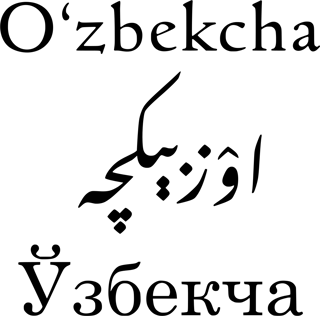Uzbek (Latin script: Oʻzbekcha, Oʻzbek tili; Cyrillic script: Ўзбекча, Ўзбек тили; Perso-Arabic script: اۉزبېکچە, اۉزبېک تیلی, [ozˈbekt͡ʃæ; ozˈbek tɯˈlɯ]), formerly known as Chagatai Turki, is a Turkic language spoken by Uzbeks. It is the official, and national language of Uzbekistan. Uzbek is spoken as either native or second language by 44 million people around the world (L1+L2), making it the second-most widely spoken Turkic language after Turkish. There are two major variants of Uzbek language, Northern Uzbek spoken in Uzbekistan, Kyrgyzstan, Kazakhstan, Tajikistan, Turkmenistan and China and Southern Uzbek spoken in Afghanistan and Pakistan. Uzbek belongs to the Eastern Turkic or Karluk branch of the Turkic language family. External influences include Arabic, Persian and Russian. One of the most noticeable distinctions of Uzbek from other Turkic languages is the rounding of the vowel /ɑ/ to /ɔ/, a feature that was influenced by Persian. Unlike other Turkic languages, vowel harmony is nigh-completely lost in modern Standard Uzbek, though it is (albeit somewhat less strictly) still observed in its dialects, as well as its sister Karluk language Uyghur. In February 2021, the Uzbek government announced that Uzbekistan plans to fully transition the Uzbek language from the Cyrillic script to a Latin-based alphabet by 1 January 2023. Similar deadlines had been extended several times. From Wikipedia



